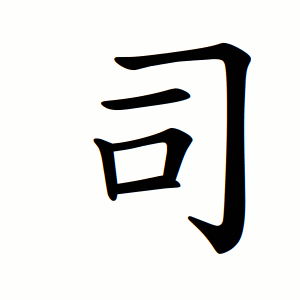司
- to take charge of;
- to oversee;
- to guard;
- official duty;
Etymology
An associative compound:
Based on the form of 后 (“sovereign, ruler”), inverted and simplified.
Originally depicted a person in authority with mouth/commands, denoting oversight, responsibility, and official functions.
Thus, 司 came to mean “to be in charge of, to supervise, to administer.”
Usage in Korean
司令 (사령) — commander; command
司法 (사법) — judicial, administration of justice
司會 (사회) — master of ceremonies; moderator
司直 (사직) — to uphold justice, “guardian of law”
御史大司 (어사대사) — a high official overseeing inspections in classical administration
Additional notes
In ancient China, 司 was frequently used in official titles, indicating the person responsible for a specific duty (e.g., 司徒, 司馬, 司空 — the Three Excellencies).
The character conveys both the sense of responsibility and the official position tied to it.
Alternative forms
㟃 (used for a mountain name, also pronounced sa).
- 尸一口 (SMR)
- ⿹ 𠃌 𠮛
